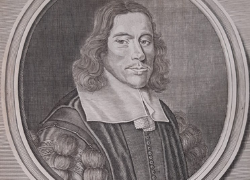
Celebrating the 400th anniversary of Thomas Willis’s birth
08 February 2021
Neuroscience News
Celebrate the 400th anniversary of Thomas Willis’s birth by learning more about the impact Willis and his work had on neuroscience! Watch this space every Monday for new content by the University of Oxford.
On 27 January 2021, we will be celebrating the 400th anniversary of the birth of Thomas Willis, who laid the foundations of modern neuroscience. To mark the occasion, we invite you to have a look at the series of video interviews prepared by the Department of Physiology, Anatomy and Genetics at the University of Oxford (UK). These interviews feature historians, neurologists, neuroscientists and writers who will discuss various aspects of Willis’ life.
Video interviews to celebrate the 400th birthday of Thomas Willis
Thomas Willis (1621 – 1675) 400th Birthday – Erica Charters in conversation with Zoltán Molnár.
Professor Zoltán Molnár talks to Dr Erica Charters for a History of Medicine perspective on Oxford physician and Father of Neurology Thomas Willis. (released on Monday 11 January 2021)
Thomas Willis (1621 – 1675) 400th Birthday – Alastair Buchan in conversation with Zoltán Molnár
Professor Zoltán Molnár talks to Pro-Vice-Chancellor Professor Alastair Buchan to learn more about Thomas Willis’s residence and base for scientific discoveries, Beam Hall.
Thomas Willis (1621 – 1675) 400th Birthday – Chrystalina Antoniades in conversation with Zoltán Molnár: The Circle of Willis
Professor Zoltán Molnár talks to Associate Professor Chrystalina Antoniades for an in-depth look at the Circle of Willis, the name given to the arterial ring at the base of the brain, in recognition of the man renowned for its original description.
Thomas Willis (1621 – 1675) 400th Birthday – Alastair Compston in conversation with Zoltán Molnár: An insight into the writings of Willis
Professor Zoltán Molnár talks to Professor Emeritus of Neurology Alastair Compston FRS about the deeply influential texts written by the Founder of Neurology Thomas Willis four centuries ago.
Thomas Willis (1621 – 1675) 400th Birthday – Kevin Talbot in conversation with Zoltán Molnár: Exploring the medical cases of Thomas Willis
Professor Zoltán Molnár talks to Professor Kevin Talbot about Willis’s insights into the patients he encountered and his descriptions of their symptoms that could arguably be used for teaching today.
Thomas Willis (1621 – 1675) 400th Birthday – Miloš Judaš in conversation with Zoltán Molnár: What we learn from translating the works of Willis
Professor Zoltán Molnár talks to Professor Miloš Judaš for a unique comparison of Thomas Willis’s profound discoveries and medical terminology in his original Latin tongue and the first English translations.
Thomas Willis (1621 – 1675) 400th Birthday – Petra Hofmann in conversation with Zoltán Molnár: The Willis Legacy in St John’s College Library
Professor Zoltán Molnár and St John’s College Librarian Dr Petra Hofmann explore the extraordinary collection of Thomas Willis’s books and rare letters held by the library 400 years after his birth.
Iain Pears in conversation with Zoltán Molnár: An insight into Willis era Oxford through writing “An Instance of the Fingerpost”
Professor Zoltán Molnár talks to author and historian Iain Pears to better understand “a time and place of great intellectual, religious, scientific and political ferment” in which Thomas Willis lived and worked.
About Thomas Willis
His name is usually associated with ‘the circle of Willis’ and coining the word ‘neurologia’, but his work also formed the foundation of basic neuroanatomical description and nomenclature, and comparative neuroanatomy and he is the founder of clinical neurology.
Willis’ way of observing and treating patients was different to that of many of his contemporaries, owing to his original observations and critical views. He made pioneering observations of various neural structures, and his system of nomenclature is still used. Willis was also the first person to propose that the higher cognitive function of the human brain comes from the convolutions of the cerebral cortex.
By combining his insightful clinical observations with his original pathological studies, his enquiring mind established links that are still astonishing 400 years on. For these reasons, Willis’ name and achievements should be proclaimed to every new generation of anatomists and neuroscientists.